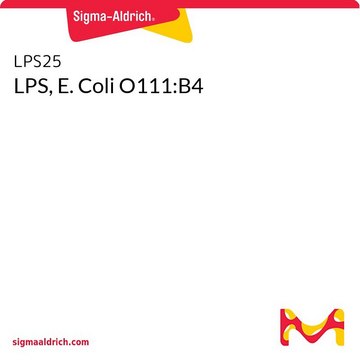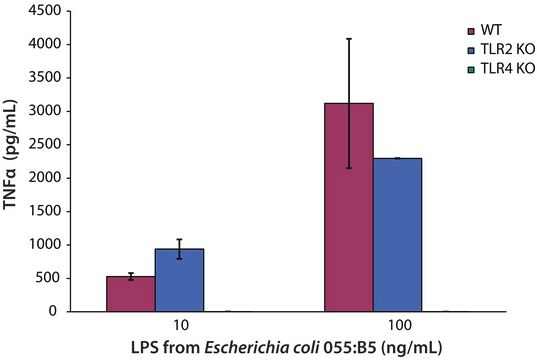L4516
Lipopolysaccharides from Escherichia coli O127:B8
BioXtra, suitable for cell culture, γ-irradiated
Synonym(s):
LPS
Sign Into View Organizational & Contract Pricing
All Photos(1)
About This Item
Recommended Products
biological source
Escherichia coli (O127:B8)
Quality Level
sterility
γ-irradiated
product line
BioXtra
form
lyophilized powder
purified by
gel-filtration chromatography
technique(s)
cell culture | mammalian: suitable
impurities
<1% Protein (Lowry)
solubility
H2O: 5 mg/mL, slightly hazy
storage temp.
2-8°C
Looking for similar products? Visit Product Comparison Guide
Application
Lipopolysaccharides from Escherichia coli 0127:B8 has been used:
- to study the LPS-induced macrophage survival in mice
- to elicit the secretion of cytokines by cattle PBMC
- to study apoptosis of highly susceptible macrophage cells in a LPS-induced proinflammatory environment
- to perform autophagy assay in BV2 and BV2-LC3 cells
- for stimulation of human monocytes, macrophages and mouse microglia cells
- to induce pentraxin-3 expression in 293T cells
Lipopolysaccharides (LPSs) are characteristic components of the cell wall of Gram-negative bacteria. LPS and its lipid A moiety stimulate cells of the innate immune system by the Toll-like receptor 4 (TLR4), a member of the Toll-like receptor protein family, which recognizes common pathogen-associated molecular-patterns (PAMPs).
Biochem/physiol Actions
Lipopolysaccharides (LPSs) are characteristic components of the cell wall of Gram-negative bacteria. LPS and its lipid A moiety stimulate cells of the innate immune system by the Toll-like receptor 4 (TLR4). Being an immunogenic antigen, it enhances immune responses to soluble antigens.
Reconstitution
Lipopolysaccharides are supplied as lyophilized, γ-irradiated powders. To reconstitute, add 1 ml sterile balanced salt solution or tissue culture medium to the vial (1 mg) and gently swirl until the powder dissolves. Reconstituted product may be further diluted to desired working concentrations using sterile balanced salt solution or tissue culture medium.
Other Notes
To gain a comprehensive understanding of our extensive range of Lipopolysaccharides for your research, we encourage you to visit our Carbohydrates Category page.
related product
Product No.
Description
Pricing
Signal Word
Danger
Hazard Statements
Precautionary Statements
Hazard Classifications
Acute Tox. 2 Oral
Storage Class Code
6.1A - Combustible acute toxic Cat. 1 and 2 / very toxic hazardous materials
WGK
WGK 3
Flash Point(F)
Not applicable
Flash Point(C)
Not applicable
Choose from one of the most recent versions:
Already Own This Product?
Find documentation for the products that you have recently purchased in the Document Library.
Customers Also Viewed
W A Jensen et al.
Journal of virology, 66(7), 4427-4433 (1992-07-01)
The in vitro expression of bovine leukemia virus (BLV) in short-term cultured bovine peripheral blood mononuclear cells (PBMC) is associated with increased spontaneous lymphocyte blastogenesis. The purpose of this study was to determine whether intracellular pathways responsible for antigen- or
Debby Kruijsen et al.
Vaccine, 29(15), 2730-2741 (2011-02-15)
Inactivated respiratory syncytial virus (RSV) vaccines tend to predispose for immune mediated enhanced disease, characterized by Th2 responses and airway hypersensitivity reactions. We show in a C57BL/6 mouse model that the early innate response elicited by the challenge virus (RSV
A Charlotte M T de Wolf et al.
PloS one, 12(6), e0179942-e0179942 (2017-06-29)
Regulatory T cells (Treg) function in the prevention of excessive inflammation and maintenance of immunological homeostasis. However, these cells may also interfere with resolution of infections or with immune reactions following vaccination. Effects of Treg on vaccine responses are nowadays
Hye-Eun Han et al.
Biomolecules & therapeutics, 21(1), 21-28 (2013-09-07)
Microglia play a role in maintaining and resolving brain tissue homeostasis. In pathological conditions, microglia release pro-inflammatory cytokines and cytotoxic factors, which aggravate the progression of neurodegenerative diseases. Autophagy pathway might be involved in the production of pro-inflammatory cytokines and
Hua Liu et al.
International journal of clinical and experimental pathology, 6(4), 660-668 (2013-04-11)
The aim of the present study was to explore the role of receptor tyrosine kinases (RTKs) in the regulation of expression of PTX-3, a protector in atherosclerosis. Human monocytic U937 cells were infected with a shRNA lentiviral vector library targeting
Our team of scientists has experience in all areas of research including Life Science, Material Science, Chemical Synthesis, Chromatography, Analytical and many others.
Contact Technical Service


